Ichi (DVD)
Introduction
Just one solitary film oughtn't be a reason to follow a director's career, but somehow, Fumihiko Sori's debut, Ping Pong, convinced me that this was a director to keep an eye on. He served as producer on Shinji Aramaki's Appleseed next, and that early dabbling with cel-shaded CGI carried through to his next feature as director, Vexille. While Appleseed was fun but flawed, Vexille was a little more disappointing. In fact, one of the few points of that DVD that stood out for me was the sneak peak of his next live action feature film, Ichi, the film that I have now just watched. Based on my extensive experience with his output, I much prefer his live action movies. However, he is returning to cel-shaded CGI for 2001 Nights, the teaser trailer for which is now doing the rounds.
To get an idea of what Ichi is all about, it may be necessary to go to the IMDB, and search for Zatoichi. After having your mind truly boggled by the 30 or so matches, you'll realise just how prevalent an idea this is in Japanese creative fiction, that of the blind swordsman. It's even been given a Hollywood makeover in Blind Fury. There's something compelling about the idea of a supremely skilled Samurai, yet one who is profoundly blind. It almost verges on superpowers, and there is the added pleasure of seeing the ostensible underdog, giving the all-powerful and arrogant villains a well-deserved pasting. But, as fate would have it, I have managed to avoid all the Zatoichi movies, and even Rutger Hauer's Blind Fury. I'm coming to this particular genre fresh, which is probably a good thing, as I won't have any preconceptions. But I also won't be able to comment on the big twist in the format, and make any valid comparisons. For Sori's take on Zatoichi, the central character, the blind sword-wielder is female.
There was a tradition of blind 'goze' musicians in Japan, women who had lost their sight and had been trained on traditional instruments to perform and sing for their livelihoods. The stipulation was that these women should remain chaste, pure, and never know the touch of man. Which is why Ichi's troupe cast her out, and why she has to make her way alone in the world. It isn't all that bad. She has an uncanny ability with the sword, and taking care of herself is not a problem. It's just that she chooses not to get involved with the world. It's why she was sitting by, when a blind prostitute was being beaten by some bandits who didn't feel like paying her. There was a Good Samaritan who came to the prostitute's aid though, a passing samurai named Toma Fujihira. For some strange reason, Ichi was moved to help when Toma couldn't draw his sword from its sheath. Indebted, she travels with Toma to the town of Bito, where she puts her acute senses to use helping him win back the money he lost. The bandits at the gambling den don't take too kindly to losing their money, one thing leads to another, and soon corpses surround Ichi and Toma. The townsfolk arrive, and incorrectly assume that Toma was responsible, and hail the itinerant samurai as their hero. The residents of Bito, and the Yakuza family who run the town, are plagued by bandits of the Banki-to gang, and they want Toma to get rid of them and win back their town. It isn't the best situation for a man who, try as he might, just can't draw his sword. Fortunately, Ichi isn't too far away. For years she has been searching for a blind swordsman, and she's heard that he will be visiting Bito in a few days for the festival arranged for the Government Magistrate's visit.
Picture
It's a rare occurrence, but when it happens it needs to be heralded. Ichi gets a native Film to PAL transfer, none of the faffing around with NTSC-PAL standards conversions, no juddery pans and scrolls, no ghosting and no softness. In fact, Ichi is clear and sharp throughout, bringing out the best in Sori's direction, and framing some really breathtaking shots. The action sequences are effective, the sword fights certainly hold the attention, and the fight choreography is top class. There are three types of CGI in this film, the subtle, the OTT, and the absurd. There is a lot of subtle work here; mediaeval Japan certainly doesn't exist anymore, so I'm guessing a lot of the 21st Century was brushed under the carpet with a digital broom. The OTT stuff, as you would expect, is applied to the odd dismemberment, accompanied by copious sprays of blood. There is one moment of patent absurdity in this film, where CG was sprayed on the screen with abandon to mask a multitude of sins, but it didn't manage to throw me from the experience.
The only minor flaw I found with this transfer was the fine aliasing that appears at the limits of the DVD format. This film should look absolutely awesome in Blu-ray form. And look at that, a Blu-ray release of Ichi on the same day as the DVD.
Sound
Ichi gets a DD 5.1 Japanese soundtrack, with player forced English subtitles. It's a nice surround track, with plenty of oomph for the action sequences, a cool ambience for the slow-mo bullet time type stuff, and a nice, lively feel overall. There's plenty of traditional Japanese music to set the tone, Ichi is a goze singer after all, but the movie's soundtrack is a more orchestral, world music affair, with an emphasis on vocal accompaniment. Think Lord of the Rings and you get the general idea.
The disc does need a better-placed layer change though, and it's a shame that you can't turn the subtitles off.
Extras
Manga have a new logo! It's short and sweet, a little less CG, and more of a sword swipe segue, but it keeps the heart of the company. The disc gets some nice, animated menus, but the only extra you'll find on this disc is the trailer. It's a shame, as Ichi is a film that could have used a few extra features.
Conclusion
I thoroughly enjoyed Ichi. It's an entertaining action movie with a heart, which is relatively rare in this day and age. It's also my first experience with the blind swordsman genre, and if this is any example, I'll be sure to look up the original Zatoichi films as well. Actually, it plays into the genre of movies that I grew up with, Westerns, with swords taking the place of guns, but the one horse towns, the downtrodden townsfolk, the rapacious bandits, and the tainted hero, all common archetypes.
Ichi is the titular heroine, with a razor sharp and lightning fast ability with the sword. She's blind, which makes her abilities seem preternatural, and her heart is hardened to the world by her tragic past. She was left with a goze troupe at an early age, and trained as a musician. But the strict rules of the goze state that no woman should lie with a man, whether it's through choice or as a victim of an assault. As a result, Ichi was shunned by her only family, and cast out into the harsh world. Ever since then, and protected by her sword skills, she has been making her way as a solo musician, staying aloof from the world, and searching for an elusive blind swordsman, the man who left her with the goze group when she was child.
The first time she re-engages with the world is when she meets Toma Fujihira, an itinerant samurai who comes to the rescue of a prostitute set upon by bandits, only to find himself in deep water when he can't remove his sword from its sheath. He's likeable, friendly, and prone to finding himself in trouble. He enters the film as the comic relief, but as his character develops, he shows a sympathetic side, and also a tragic past. His altruism awakens something in Ichi that leads her to help him, although it seems the more help she gives him, the more trouble he finds. Ichi's heart warms further when she meets a boy who acts as her guide in the town of Bito. He lives alone with his father, and is always on the lookout for a new mother, which is why he is first drawn to Ichi. She can't stand kids of course, but something about his honesty and innocence is refreshing. This central trio, and Toma and Ichi in particular, are well-drawn characters with nuance and depth, and through engaging and sympathetic performances from Haruka Ayase and Takao Osawa, this film becomes really very appealing.
It doesn't hurt that Sori is such a visual director, and this film is full of memorable visuals, choreographed action set pieces, and some breathtakingly beautiful camera composition. If there is a weakness in the film, it's the villain of the piece, Banki. With the sort of depth and layering to the main characters, you'd expect the same for the bad guys, and indeed with his tale of a former government official, shunned for the accident that scarred his face, and turning to banditry as a result, he does promise to be an interesting villain. Alas, Shido Nakamura plays him as a pretty one dimensional pantomime baddie, all grimaces and evil-villain laughs. He lacks depth, and is really just up there as a foil for the heroes to defeat. Shido Nakamura is a face you may recognise from Sori's earlier film, Ping Pong, in which he played Dragon. There's another Ping Pong alumnus as well, as Yôsuke Kubozuka appears as a Yakuza boss in Ichi. He played Peco in the earlier film.
The shallowness of the villain is small potatoes really. He gives good snarl, and is evil enough for you to be rooting all the harder for the good guys. Ichi is blessed in several regards though, it has sumptuous visuals, and an affecting soundtrack, it has a nice balance of comedy and drama, blisteringly fast action, moments to pause and reflect, and it has engaging characters with good performances. It's a solid and entertaining action film, which I found to be more appealing than any of this summer's blockbusters. The disc may be light on extras, but the presentation of the film by Manga Entertainment is top notch. The only reason not to invest in this disc is if you have a Blu-ray player, as the Blu-ray disc comes out on the same day.
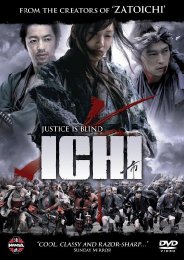
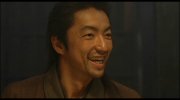


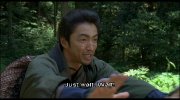
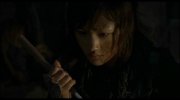

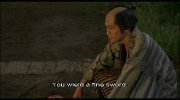
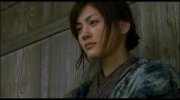
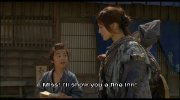

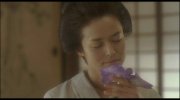


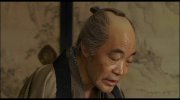
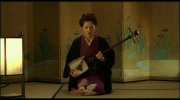


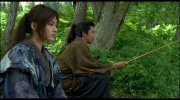
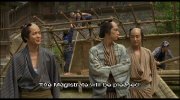
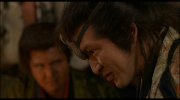
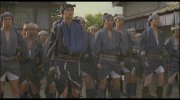
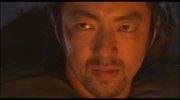
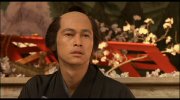
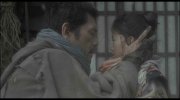
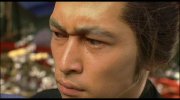
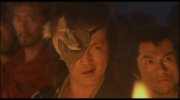
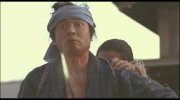
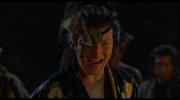
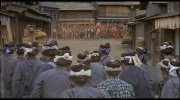











































Your Opinions and Comments
Be the first to post a comment!